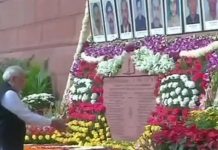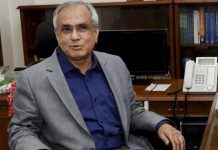
Although it it began unusually with a camel, the story of the terror cases against the six men who escaped from a Madhya Pradesh prison this month has a familiar pattern. An overwhelming number of Muslim men accused of terrorism across India over the past decade or so have been found to be framed. Many were freed after years of incarceration had ruined their lives. But an acquittal does not lessen the risk of being named in fresh cases. And every acquittal earned is outmatched by 10 new accused grabbed elsewhere.
The question is, if most are innocent, why do the police specifically pick them? But the police rarely target specific men. It is most often a petty criminal, or a hot-headed youth, or simply a young man at the wrong place at the wrong time crossing the path of some cop. A short hop brings in families, neighbours and friends into the net of terror cases, as had happened with the men who escaped from Khandwa town’s prison on 1 October.
This story begins with Mohammad Khalil, although he is not among the escapees. A resident of Khandwa who rented out his autorickshaws for a living, Khalil teamed up with other Muslims in 2006 to buy a camel to slaughter as a holy offering. The police chief, however, seized the animal to “protect Hindu-Muslim peace”. The Muslims demanded to know the law banning camel slaughter. “They had a heated argument,” recalls Khalil’s brother, Javed Chauhan, a city lawyer. Khalil moved court. Two years later, a judge ordered the camel be given back to him. The police filed the camel’s post-mortem report.
Of course, the case was already irrelevant. In the interim, the police had filed a slew of cases against Khalil, accusing him of rioting and breaching communal peace, among others. Khalil would later be acquitted of all charges. In 2007, Khalil and two others riding on his motorcycle ran into a neighbourhood rival. There were fisticuffs. Both sides filed cases. One of Khalil’s companions named Amjad, a petty labourer with no previous police record, became a witness. But police took sides as a henchman of Khalil’s rival who, too, was present there, was a “pocket witness”, or one who deposes regularly for the prosecution.
Although a compromise was reached and the cases withdrawn, the police accused Khalil of making sectarian speeches in April 2008 under the Unlawful Activities Prevention Act (UAPA), a draconian law from 1967 routinely slapped on Muslims accused of terrorism. The police also arrested Amjad, accusing him of storing publications of the Students Islamic Movement of India (SIMI), an outfit banned since 2001 for alleged terror activities.
Both arrests were based only on the confession of two other men arrested for allegedly distributing banned SIMI literature. Six months ago, Amjad was acquitted in that case. His lawyer says the prosecution’s chargesheet laid out no offence against his name. But the police arrested him again in June 2011, claiming they nabbed him and 14 others as they met to plan terror acts. Incredibly, a week before that arrest, Amjad’s family had moved court alleging the police had illegally picked him and were refusing to release him. Would he be so idiotic to go plan a conspiracy a week after a plea was moved in his name?
In November 2011, police accused Amjad of a more serious charge, the murder of a city policeman named Sitaram Yadav. A year before Yadav’s murder, Amjad’s family had moved court claiming Yadav had forcibly taken him away and was torturing him in illegal confinement. The court dismissed the plea on the technicality that the family had not correctly named Yadav’s department. Weeks later, Yadav arrested Amjad under UAPA. Amjad was subsequently acquitted of the terror charges. But he was already being tried for Yadav’s murder. On 1 October, Amjad escaped from Khandwa prison with five others.
Mehboob is another escapee. A tailor who lived in a thatch-roofed hut with his parents, Mehboob picked up odd stitching jobs from city tailoring shops. In a good month, he could earn up to Rs 4,000. He, too, never had a single case against him until 2008 when the police booked him in the same case they filed against Khalil and Amjad, because, says his family, he lived in the neighbourhood and on occasion had interacted with Amjad.
Accused of spreading communal hatred, Mehboob has since been acquitted. But he has numerous other cases, including murder attempts on the city’s RSS-BJP leaders and for Yadav’s murder. All the police have is his alleged confession that is anyway inadmissible as evidence. At the first opportunity, he told a judge he had never signed a confession, but the case goes on. His mother works odd jobs. His father has since turned a beggar.

Zakir too escaped on 1 October. He dropped out of school after Class X for lack of money to pay his fees. Before his name ever came up in terror cases, he worked as a construction labourer first and then as a masonry apprentice. “He quickly became the city’s most sought-after mason,” says Praveen Dube, an insurance agent. But when police picked up some neighbours of his age after a Hindu-Muslim quarrel in 2008, Zakir panicked and fled. That was a terrible mistake. The police began hounding his kin. When they couldn’t find him, they took in a brother of his named Altaf.
In June 2011, police claimed they arrested Zakir from the railway station in Ratlam city, 250 km from Khandwa, after a shootout in which he took a bullet. Since then, he has been named in various cases of murder or attempt to murder for which most of the other escapees, too, have been booked. Once again, all the police have is a confession that his lawyer says he never made. On the night he escaped from Khandwa prison, Zakir’s brother Altaf, too, was in the same prison ward. Accused of lesser charges, he didn’t flee.
But among the escapees, there is one man who confessed in open court to murdering Yadav, the policeman. “Sitaram Yadav used to beat us mercilessly and force us to chant ‘Jai Sri Ram’,” Abu Faisal, a doctor by education and one of the escapees, told a judge after his arrest. “I shot him to death and sent him to hell.”
ajit@tehelka.com











